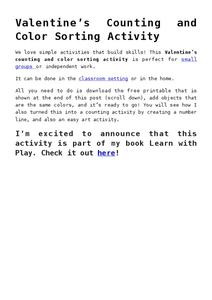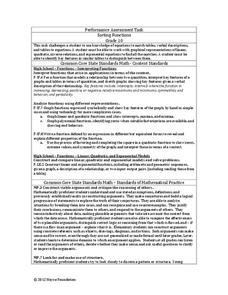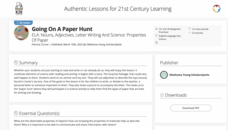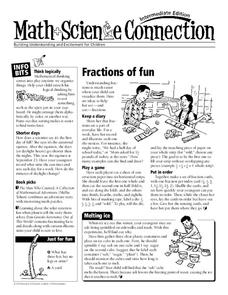Illustrative Mathematics
Sort and Count II
Capture the engagement of young mathematicians with this hands-on sorting activity. Given a bag of objects, students work independently sorting the items based on their physical attributes, counting to determine the size of each group....
Curated OER
Vocabulary Instructional Routine: Identify and Sort Common Objects into Categories
Kindergarteners build vocabulary by learning about categorization. They discuss the attributes of living and non-living things. As a class, they view and sort pictures into each category. They discuss the word category and what it means.
Math Solutions
Shape Sorting: Looking for Green!
Young mathematicians rotate, flip, and sort their way to an understanding of the different attributes of geometric figures. Using transparent yellow and blue shapes, children try to match congruent figures together...
K-5 Math Teaching Resources
Polygon Sort Sheet
What makes a polygon a polygon and how many different types are there? Invite your scholars to learn and discuss that question with this polygon sort sheet. Learners cut out each polygon and sort them by their different...
Math Worksheets 4 Kids
Sorting 2-D and 3-D Shapes
Challenge mathematicians to examine and sort a variety of 2-D and 3-D figures with a 10-problem solid shapes instructional activity.
Teaching 2 and 3 Year Olds
Valentine’s Counting and Color Sorting Activity
Reinforce the concept of one-to-one correspondence with a Valentine's Day-themed counting and color sorting activity. Scholars sort foam hearts by color—red, orange, yellow, green, blue, and purple—then count and place them on a number...
Howard Hughes Medical Institute
Sorting Finch Species
Don't just tell your class about Darwin's finches ... show them! Sort some of science's most famous birds using an interactive lesson. Learners try their hand at classifying finches using song, sonogram, and beak appearance, as well as...
Kindergarten Kindergarten
Living and Non-Living Sort
What do an ice cream cone, bicycle, and alarm clock all have in common? That's exactly what young scientists will find out as sort these pictures and learn about the differences between living and non-living things.
Curated OER
Desert Animal Sorting
What makes certain animals better suited for desert life than others? Explore the differences between desert and non-desert animals with this picture sorting activity. Be sure to print the worksheet in color so students can observe and...
Berkshire Museum
Reduce, Reuse, and Recycle: Sorting Through Personal Choices
Raise children's awareness about the importance of conservation with this hands-on science activity. Start by breaking the class into groups and having them collect trash from around the school or local park. Learners then use the...
Mathematics Assessment Project
Sorting Functions
There's no sorting hat here. A high school assessment task prompts learners to analyze different types of functions. They investigate graphs, equations, tables, and verbal rules for four different functions.
Curriculum Corner
Digraph Word Sort Recording
Young readers sort their way through a deck of word cards in order to become familiar with four common spelling patterns. Focusing on the ch-, sh-, wh-, and th- consonant digraphs, students draw cards and write...
Concord Consortium
Yearbook Pictures
Sorting memories doesn't have to be difficult. Young mathematicians evaluate two different methods of sorting yearbook pictures. They answer a set of questions to explore each method, then develop their own sorting procedure based on...
Inside Mathematics
Sorting Functions
Graph A goes with equation C, but table B. The short assessment task requires class members to match graphs with their corresponding tables, equations, and verbalized rules. Pupils then provide explanations on the process they used to...
Florida Center for Reading Research
Phonics, Letter-Sound Correspondence: Letter Bag
An activity focuses on final sounds sorting. Scholars pull objects out of a bag, identify what letter sound the object ends with, then draw the picture under the appropriate column.
K20 LEARN
Going on a Paper Hunt: Nouns, Adjectives, Letter Writing and Science - Properties of Paper
A lesson introduces scholars to nouns and adjectives. After listening to a short story and practicing creating adjectives with a card sort, pupils go on a paper hunt to locate different types of paper, complete a chart with adjectives,...
Nemours KidsHealth
School Lunch: Grades K-2
Two lessons encourage scholars to make smart eating choices. The first lesson sorts food items into the MyPlate's food groups. Learners scour magazines to cut and paste examples onto a paper plate that showcases each group. Then, draw...
Little Bit Studio
Bugs and Buttons 2
Playing with bugs and buttons has never been so much fun! Offering a variety of different activities, this is a great resource for developing basic skills in preschool and kindergarten-aged children.
PreKinders
Pre-K Assessment Forms
This is a Pre-K teacher's must-have resource for pre-assessing learners at the beginning of the school year! Covering everything from alphabet recognition and sorting objects to social-emotional development and work habits, this...
Resources for Educators
Fractions of Fun
Reinforce concepts and encourage learner engagement with a collection of math games, science experiments, and cross curricular activities. In one fun resource, learners sort objects, keep a diary of everyday fractions, play a game using...
Science Education Resource Center
Compare and Contrast deciduous and evergreen tree leaves to aid in tree identification
Boost observational skills and get to know the difference between deciduous, coniferous, and evergreen trees with a lesson that challenges scholars to compare, contrast, identify, sort, and draw their findings.
Starfall
Short U - Classification (Person, Animal, Thing)
In this word sort worksheet, students will sort five short /u/ words into their proper categories: person, animal, or thing. Students will use a word bank with pictures.
EngageNY
Arithmetic and Geometric Sequences
Arithmetic and geometric sequences are linear and geometric patterns. Help pupils understand the relationship and see the connection with an activity that asks them to write the rules and classify the patterns correctly. A sorting...
Florida Center for Reading Research
Phonics: Letter- Sound Correspondence, Brown Bag It
Sorting objects according to their initial sound get scholars thinking about letter-sound correspondence. With 26 brown bags labeled with a letter of the alphabet, learners browse magazines and cut out images that begin with the...
Other popular searches
- Candy Sorting
- Sorting Attributes
- Sorting Shapes
- Sorting Polygons
- Sorting and Classifying
- Attribute Block Sorting
- Sorting Rocks
- Letter Sorting
- Word Sorts
- Sorting Buttons
- Classify and Sort Objects
- Sorting Students























